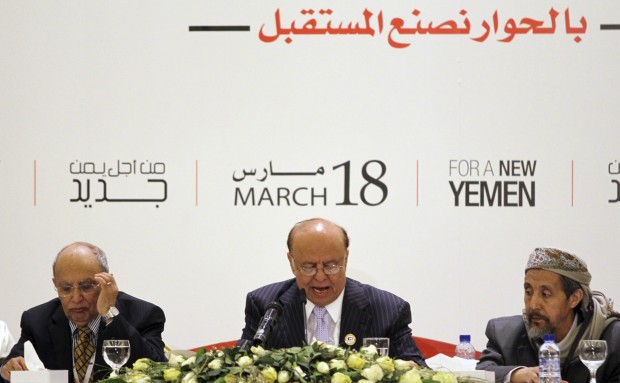
Yemen’s President Abd Rabbo Mansour Hadi (C) speaks next to members of the dialogue committee during the first opening session of a national dialogue conference in Sanaa March 19, 2013. (REUTERS/Mohamed al-Sayaghi)
London, Asharq Al-Awsat—Yemen officially launched the comprehensive National Dialogue Conference on Monday at the presidential palace in Sana’a.
This dialogue is planned to go on for the next six months. Headed by President Abd Rabbo Mansour Hadi, it takes place in light of the Gulf initiative and its executive mechanism which resolved the political crisis that beset Yemen following the youth uprising in early 2011. The president has appointed a number of deputies to chair the conference sessions in his absence.
Secretary-General of the Gulf Cooperation Council (GCC), Dr Abdullatif Zayani, and UN envoy to Yemen, Jamal Benomar, were among a number of prominent Arab and international officials that attended the launching of the conference.
President Hadi highlighted a number of important issues in his speech at the opening ceremony during which he referred to the regional and international support enjoyed by the National Dialogue. He also stressed the importance of the success of the conference by reminding the various sections of Yemeni society that “success is the only option for the National Dialogue.”
The National Dialogue’s launch coincided with the second anniversary of the Al-Karama massacre of 2011 (known as the “Friday of Dignity”) when more than 50 young Yemenis were killed in Sana’a. President Hadi referred to this incident, saying: “Fate wants this major conference to start its sessions on the eighteenth of March in order to remember the Yemeni youths who were martyred two years ago. This incident shook the conscience of the whole world and represented the beginning of the search for a political solution.”
The Yemeni president also praised the Gulf initiative that protected Yemen against the prospect of civil war, securing peace and the National Dialogue. Hadi dubbed this “a serious step in the Yemeni journey to reach this day which will be a memorable day in the history of Yemen.”
He also urged the delegates to forget past differences and work together according to Yemen’s national interests, rather than according to personal or particular political agendas.
Hadi emphasized that the southern issue remains the most important one to be discussed at the National Dialogue adding that this represents the key for any long-standing solution.
The National Dialogue’s opening session was postponed by two hours as the conference delegates waited for GCC Secretary-General Abdullatif Zayani to arrive. He had been delayed by a technical fault with his aeroplane.
Yemeni Prime Minister Mohammed Salem Basindawa did not attend the National Dialogue opening session. He is reported to have objections regarding its arrangements.
Nobel peace laureate Tawakul Karman and Yemeni tribal chief Hamid Al-Ahmar both pulled out of the opening session for reported dissatisfaction with the youth representation at the National Dialogue.
Rajeh Badi, Media Adviser to the Yemeni Prime Minister, informed Asharq Al-Awsat that “those who pulled out will be contacted to discuss the reasons for their refusal to attend the opening session”
The majority of the Yemeni people are hopeful that the National Dialogue will bring an end to their suffering, looking on this as a golden opportunity to put the political crisis and civil war behind them. In the meantime, the southern issue remains the most important and sensitive issue on the agenda of the National Dialogue. Many prominent leaders of Al-Hirak, the Yemeni southern movement, have boycotted the dialogue while calling for negotiations for southern independence.
Badi stressed that “the doors are open” to these Al-Hirak leaders to join the National Dialogue whenever they are ready to do so.
